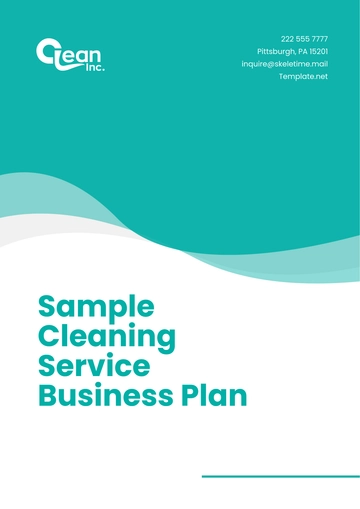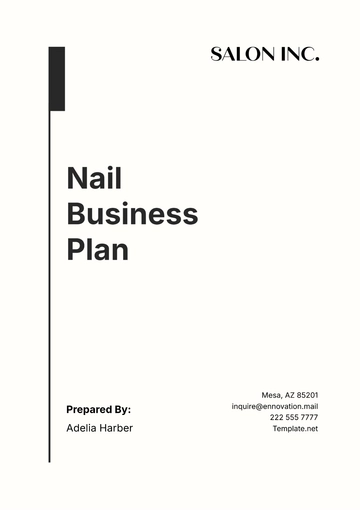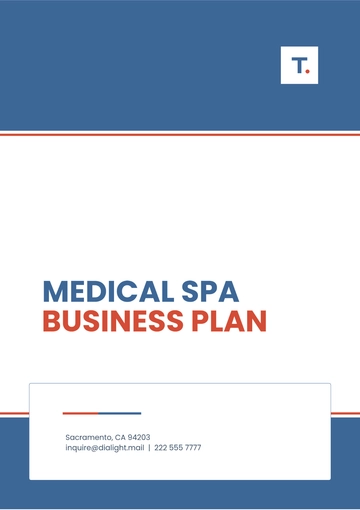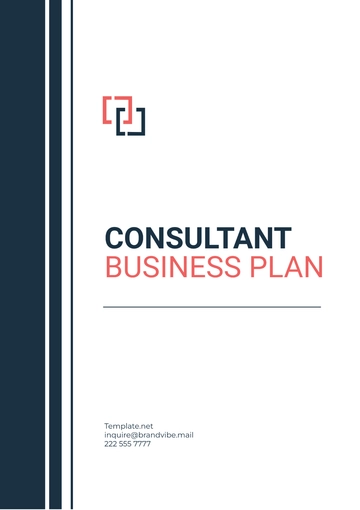Free Water Purification Business Plan
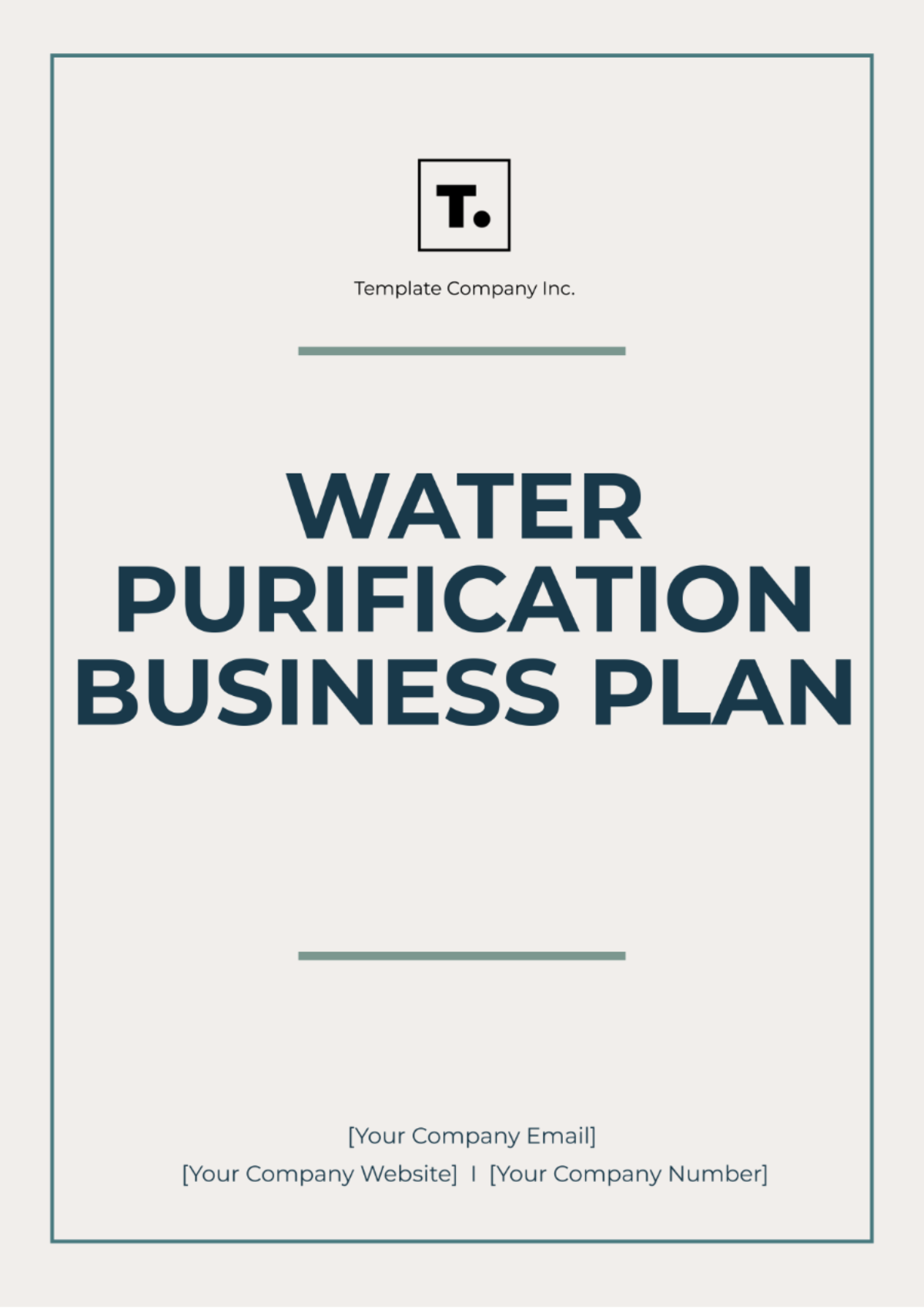
I. Executive Summary
A. Business Overview
[Your Company Name] is dedicated to providing high-quality water purification solutions for various purposes, including drinking, industrial processes, and agriculture. Located in [Your Company Address], our company aims to deliver efficient and sustainable water purification services to meet the needs of our clients.
B. Mission Statement
Our mission is to ensure access to clean and safe water for all by offering innovative water purification technologies and services that prioritize efficiency, sustainability, and affordability.
C. Business Objectives
To become a leading provider of water purification solutions in the region within the next three years.
To expand our client base across different sectors, including residential, commercial, and industrial.
To continuously innovate and improve our technologies to address evolving water quality challenges.
II. Company Description
Company Name: [YOUR COMPANY NAME]
Company Address: [YOUR COMPANY ADDRESS]
Company Phone Number: [YOUR COMPANY NUMBER]
Company Email: [YOUR COMPANY EMAIL]
Company Website: [YOUR COMPANY WEBSITE]
Company Social Media: [YOUR COMPANY SOCIAL MEDIA]
Legal Structure
[Your Company Name] is structured as a Limited Liability Company (LLC), established on January 1, 2050.
III. Products and Services
A. Water Purification Solutions
Drinking Water Purification: Providing filtration and purification systems for residential and commercial use.
Industrial Water Treatment: Offering customized solutions for industrial processes, including filtration, reverse osmosis, and disinfection.
Agricultural Water Management: Implementing irrigation systems and water treatment solutions for agricultural applications.
B. Maintenance and Support Services
Installation: Ensuring proper installation of purification systems and equipment.
Maintenance: Providing regular maintenance and servicing to optimize system performance and longevity.
Technical Support: Offering technical assistance and troubleshooting to clients as needed.
IV. Market Analysis
A. Industry Overview
The water purification industry plays a crucial role in ensuring access to clean and safe water for various purposes, including drinking, manufacturing, and agriculture. With growing concerns about water quality and scarcity, the demand for effective purification solutions is on the rise.
B. Target Market
Our primary target market includes residential consumers, commercial enterprises, and industrial facilities requiring reliable and efficient water purification solutions. Additionally, we aim to cater to agricultural clients seeking sustainable water management practices.
C. Competitive Analysis
While the water purification industry is competitive, [Your Company Name] differentiates itself through its focus on innovation, quality, and customer service. By offering customized solutions tailored to the specific needs of each client, we aim to establish long-term partnerships and maintain a competitive edge in the market.
V. Marketing Strategy
A. Brand Positioning
[Your Company Name] positions itself as a trusted partner in providing cutting-edge water purification solutions that prioritize efficiency, sustainability, and affordability.
B. Marketing Channels
Digital Marketing: Leveraging online platforms, such as our website and social media channels, to showcase our products and engage with potential clients.
Industry Events: Participating in trade shows, conferences, and exhibitions to showcase our technologies and network with industry professionals.
Direct Sales: Building relationships with clients through direct sales efforts and personalized consultations.
C. Customer Education
Workshops and Webinars: Hosting educational events to raise awareness about water quality issues and the importance of purification solutions.
Content Marketing: Produce informative content, such as blog posts and whitepapers, to educate clients about our technologies and services.
VI. Operations Plan
A. Product Development
Conducting research and development to innovate and improve our water purification technologies.
Collaborating with manufacturers and suppliers to source high-quality components and materials for our systems.
B. Installation and Service
Establishing a team of trained technicians to handle installation, maintenance, and servicing of purification systems.
Implementing efficient scheduling and logistics processes to ensure timely service delivery to clients.
C. Quality Control
Implementing rigorous quality control measures to ensure the reliability and
performance of our purification systems.
Conducting regular testing and monitoring to verify water quality and system effectiveness.
VII. Financial Plan
A. Startup Costs
Research and Development: $50,000
Equipment Acquisition: $100,000
Marketing and Advertising: $30,000
Operational Expenses: $20,000
Total Startup Costs: $200,000
B. Revenue Projections
Year 1: $300,000
Year 2: $400,000
Year 3: $500,000
Year 4: $ 600,000
Year 5: $ 700,000
C. Expense Projections
Fixed Costs: $80,000 per year
Variable Costs: $20,000 per year
Total Costs: $100,000 per year
D. Break-Even Analysis
Our break-even point is projected to be reached within 12 months, with a monthly revenue target of $25,000.
VIII. Risk Management
A. Market Risks
Changing Regulations: Changes in regulations related to water quality standards and environmental protection could affect demand for water purification services.
Competitive Pressure: Intense competition from established players and new entrants may lead to pricing pressures and market share erosion.
Economic Downturn: Economic downturns could result in reduced spending by consumers and businesses on water purification solutions.
B. Operational Risks
Supply Chain Disruptions: Disruptions in the supply chain, such as shortages of key components or delays in delivery, could impact production and service delivery.
Technological Failures: Malfunctions or breakdowns in purification equipment could lead to service interruptions and reputational damage.
Quality Control Issues: Failure to maintain quality standards in purification processes could result in subpar water quality and customer dissatisfaction.
C. Financial Risks
Cash Flow Fluctuations: Variability in revenue streams and unexpected expenses may lead to cash flow challenges, affecting the company's ability to meet financial obligations.
Capital Investment Risks: Investments in research and development or expansion projects carry the risk of not generating the expected returns or facing cost overruns.
Credit Risk: Extending credit to customers could result in bad debts if they fail to make timely payments or default altogether.
D. Legal and Regulatory Risks
Compliance Failures: Non-compliance with regulations related to water quality, health, and safety could result in fines, penalties, or legal action.
Intellectual Property Disputes: Claims of intellectual property infringement from competitors or third parties could result in costly litigation and damage to the company's reputation.
Contractual Obligations: Breach of contractual agreements with clients, suppliers, or partners could lead to legal liabilities and financial losses.
E. Mitigation Strategies
Diversification: Diversify revenue streams by targeting multiple market segments and geographical regions to reduce dependence on any single market.
Continuous Monitoring: Monitor regulatory changes, market trends, and technological advancements to proactively adjust business strategies and operations.
Risk Transfer: Transfer certain risks through insurance policies, contracts, or partnerships to mitigate potential financial losses.
Investment in Technology: Invest in advanced purification technologies and equipment to enhance reliability, efficiency, and performance.
Quality Assurance: Implement robust quality control processes and regular audits to ensure compliance with quality standards and regulations.
Financial Planning: Maintain sufficient cash reserves, establish contingency funds, and conduct regular financial assessments to manage cash flow fluctuations and mitigate financial risks.
IX. Conclusion
The Water Purification Business Plan for [Your Company Name] details a strategic approach to establishing and operating a company focused on delivering high-quality water purification solutions. With an emphasis on innovation, sustainability, and customer satisfaction, [Your Company Name] aims to address the increasing demand for clean water across diverse sectors. By leveraging advanced technologies and strategic partnerships, the company aspires to become a leader in the region's water purification industry while contributing to environmental conservation and public health. The plan underscores [Your Company Name]'s commitment to integrity, excellence, and social responsibility, expressing gratitude to stakeholders for their support and envisioning a brighter future together.
IX. Appendix
Supporting Documents
Market Research Data: Comprehensive analysis of market trends, customer preferences, and competitive landscape.
Detailed Financial Projections: Forecasts of revenue, expenses, and cash flow for the next three to five years.
Legal Documents: Copies of business licenses, permits, and other legal documentation required for operation.
- 100% Customizable, free editor
- Access 1 Million+ Templates, photo’s & graphics
- Download or share as a template
- Click and replace photos, graphics, text, backgrounds
- Resize, crop, AI write & more
- Access advanced editor
Introducing the Water Purification Business Plan Template from Template.net! Crafted for entrepreneurs seeking clarity in the liquid assets market. This editable and customizable gem is not just another blueprint; it's your liquid asset manifesto. Dive into our AI Editor for seamless modifications. Transform visions into ventures effortlessly with our template. Your purified success awaits.
You may also like
- One Page Business Plan
- Coffee Shop Business Plan
- Restaurant Business Plan
- Food Business Plan
- Real Estate Business Plan
- Executive Summary Business Plan
- Cover Page Business Plan
- Nonprofit Business Plan
- Daycare Business Plan
- Construction Business Plan
- Startup Business Plan
- Medical Business Plan
- Bakery Business Plan
- Service Plan
- Hotel Business Plan
- Catering Business Plan
- School Business Plan
- Healthcare Business Plan
- Transportation Plan
- Sports Plan
- Car Wash Business Plan
- Salon Business Plan
- Clothing Business Plan
- Farming Business Plan
- Boutique Plan












